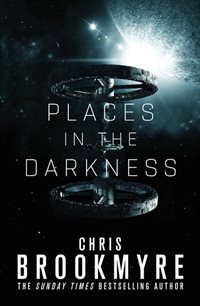
Published by Orbit on November 7, 2017
I’ve generally enjoyed Chris Brookmyre’s crime fiction. Judging from Places in the Darkness, his science fiction version of crime fiction doesn’t have the same depth. Still, the story if fun, even if it lacks originality.
Alice Blake travels to Ciudad de Cielo on behalf of the Federation of National Governments to begin her tenure as Principal of the Security Oversight Executive. While ascending the space elevator, she blacks out. When she regains consciousness, she’s a little fuzzy on the details of her trip.
Alice isn’t on the job long before trouble breaks loose. The orbiting colony has its first (reported) murder as cargo from an inbound ship is being hijacked. Former LAPD homicide detective Nikki “Fixx” Freeman is assigned to investigate it, shadowed by Alice in an undercover identity. Rumor has it that Nikki is corrupt and Alice would like to determine whether the rumor is true. It is immediately apparent to the reader that Nikki, for all her virtues as a detective, is involved in a protection and shakedown racket and perhaps some other shady activities.
The juxtaposition of those two characters contributes to the novel’s interest. Alice is morally binary; she has the virtue of refusing to be corrupted, even when her scruples limit her effectiveness. Nikki is morally flexible; her corruption gives her access to information that makes it possible for her to enforce the laws that she deems important, while ignoring or benefiting from violations (like black markets) that arguably make life easier for the colony’s residents. But by the novel’s end, neither character is quite what we expect them to be (one of them even worries that she might not be human). Having said that, neither character is given enough fullness to make think of them as real people.
The story revolves around the familiar transhuman theme of brains interfacing with computer software, and the implications of that technology. One of the questions the novel asks is whether a character should be held accountable for actions that are motivated by false memories, which parallels the current debate about whether individuals should be held accountable for actions that might be traced to damaged or underdeveloped brains. The philosophical implications that drive the story could have been explored more deeply, but Places in the Dark is more about action and solving mysteries than an exploration of free will. In that regard, the novel earns points for its steady pace and smooth flow. The story isn’t shockingly original, but it takes enough unexpected turns to keep the reader guessing for much of the novel.
RECOMMENDED